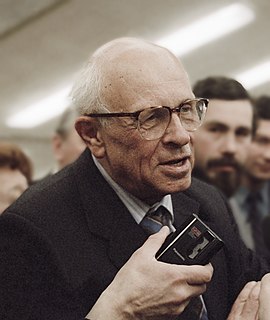Top 27 Utilitarianism Quotes & Sayings
Explore popular Utilitarianism quotes.
Last updated on April 19, 2025.
It is of note that even if utilitarianism has proved to be superior to deontology and the libertarian moral rights theory in the area of killing, we are not allowed to say that it has been finally vindicated; it has to face other challenges in other areas, in particular in situations of distributive justice.
Once we realise that utilitarianism comes with the idea of blameworthy rightdoing (such as when you push a big man onto the tracks in order to save five lives) and blameless wrongdoing (such as when you don't push a big man onto the tracks in order to save five lives), then utilitarianism all of a sudden appears to give the right answers.
The intellectual and moral satisfaction that I failed to gain from the utilitarianism of Bentham and Mill, the revolutionary methods of Marx and Lenin, the social contract theory of Hobbes, the "back to nature" optimism of Rousseau, and the superman philosophy of Nietzsche, I found in the nonviolent resistance philosophy of Gandhi. I came to feel that this was the only morally and practically sound method open to oppressed people in their struggle for freedom.
The denial of any distinction between foreseen and intended consequences, as far as responsibility is concerned, was not made by Sidgwick in developing any one 'method of ethics'; he made this important move on behalf of everybody and just on its own account; and I think it plausible to suggest that this move on the part of Sidgwick explains the difference between old-fashioned Utilitarianism and the consequentialism, as I name it, which marks him and every English academic moral philosopher since him.
Bentham spent much of his life writing constitutions and proposing legal reform in the light of his utilitarianism. The evaluation of particular acts was hardly his concern. The psychology of his day was hedonistic and he worked in that framework and passed it on to Mill, but it is clear as day that Mill was not a hedonist in the sense in which we use that term today, though he used the language of pleasure and pain to express his views.
Nietzsche is absolutely correct, even more correct today than when he wrote it in Thus Spake Zarathustra: I looked all about me for human beings but all I saw were fragments, deformed creatures with too much eye or too much ear. This is what the modern culture of specialized intellect-the kind of one-sidedness that banausic utilitarianism alone can value-works so hard to produce.
Mr. J.S. Mill speaks, in his celebrated work, "Utilitarianism," of the social feelings as a "powerful natural sentiment," and as "the natural basis of sentiment for utilitarian morality," but on the previous page he says, "if, as is my own belief, the moral feelings are not innate, but acquired, they are not for that reason less natural." It is with hesitation that I venture to differ from so profound a thinker, but it can hardly be disputed that the social feelings are instinctive or innate in the lower animals; and why should they not be so in man?
Ideas, like men, can become dictators. We Americans have so far escaped regimentation by our rulers, but have we escaped regimentation by our own ideas? I doubt if there exists today a more complete regimentation of the human mind than that accomplished by our self-imposed doctrine of ruthless utilitarianism.
Utilitarianism is a civilization of production and of use, a civilization of "things" and not of "persons," a civilization in which persons are used in the same way as things are used. In the context of a civilization of use, woman can become an object for man, children a hindrance to parents, the family an institution obstructing the freedom of its members.
Critics of Consequentialism have often assumed that hedonism (or preference-satisfaction) must be the theory of the good, that the deontic principle must be maximizing, and that the principle should be applied to individual acts. Indeed, this version is often called "classical utilitarianism" and attributed to Bentham and sometimes even to Mill. Rather than a "classical" view it is a recent construction foisted on to the tradition.
Dostoevsky believed that the gods of rationalism and materialist utilitarianism had joined in conspiracy against all other ethical systems. ... The accumulation of capital, or the acquisition of money, are endeavors par excellence which establish a quantifiable goal: hence they are directly amenable to maximization formulae.
Nothing threatens freedom of the personality and the meaning of life like war, poverty, terror. But there are also indirect and only slightly more remote dangers. One of these is the stupefaction of man (the "gray mass," to use the cynical term of bourgeois prognosticators) by mass culture with its intentional or commercially motivated lowering of intellectual level and content, with its stress on entertainment or utilitarianism, and with its carefully protective censorship.
Science only means knowledge; and for [Greek] ancients it did only mean knowledge. Thus the favorite science of the Greeks was Astronomy, because it was as abstract as Algebra. ... We may say that the great Greek ideal was to have no use for useful things. The Slave was he who learned useful things; the Freeman was he who learned useless things. This still remains the ideal of many noble men of science, in the sense they do desire truth as the great Greeks desired it; and their attitude is an external protest against vulgarity of utilitarianism.
Still, even the most admirable of atheists is nothing more than a moral parasite, living his life based on borrowed ethics. This is why, when pressed, the atheist will often attempt to hide his lack of conviction in his own beliefs behind some poorly formulated utilitarianism, or argue that he acts out of altruistic self-interest. But this is only post-facto rationalization, not reason or rational behavior.
In my view, there was a long period in which analytical philosophy had little to say about ethics. I think their intellectual tools did not do well with it, and analytical philosophy was above all about revolutionizing the philosophical tool box. It was more or less assumed that the Truth about ethics was some form of utilitarianism (perhaps because some consequentialist calculus looked to them like a respectable tool). Kantian ethics was then interpreted as a particularly odious version of the False - "deontology" - and treated with contempt.
Utilitarianism had found [in Samuel Smiles' Self-Help] its portrait gallery of heroes, inscribed with a vigorous exhortation to all men to strive in their image; this philistine romanticism established the bourgeois hero-prototype the penniless office-boy who works his way to economic fortune and this wins his way into the mercantile plutocracy.
According to classical utilitarianism, the only intrinsic good is happiness; the only intrinsic bad is pain. That implies no intrinsic value in preserving nature, that preserving an endangered plant is valuable only if it benefits humans or other animals. Intuitively, that seems wrong but perhaps I shouldn't trust my intuition here.



















